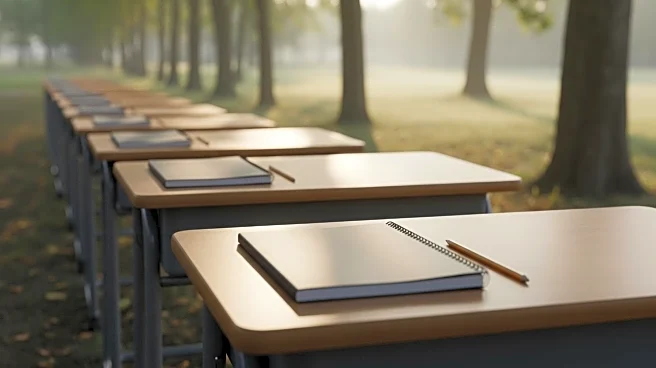What's Happening?
Israeli high school students have initiated a nationwide strike on the first day of the academic year, demanding a hostage release deal and a cease-fire in Gaza. Approximately 100 students gathered at Tel Aviv's Hostage Square, subsequently blocking the entrance to the Israeli Education Ministry offices. The protest extended to the Ayalon Highway, with teenage activists locking gates at 17 schools in central Israel, including Ramat Gan, Givatayim, and Tel Aviv. The students are expressing their refusal to return to routine amid the ongoing hostage crisis, highlighting the breach of the contract between the state and its citizens. Education Minister Yoav Kisch has previously opposed a hostage deal, stating the possibility of returning hostages through a mediated proposal is zero.
Why It's Important?
The student-led protests underscore significant societal unrest and dissatisfaction with the government's handling of the hostage crisis. This movement reflects broader discontent with the current administration's policies, particularly among the younger generation. The strike impacts the education system, as students refuse to attend classes, demonstrating solidarity with hostages and calling for international intervention. The protests could influence public opinion and pressure the government to reconsider its stance on the hostage situation and the ongoing conflict in Gaza. The actions of these students may also inspire other civil society groups to voice their concerns, potentially leading to larger demonstrations and calls for policy changes.
What's Next?
The protests may prompt further actions from student groups and civil society organizations, potentially leading to increased pressure on the government to address the hostage crisis. Education Minister Yoav Kisch and other political leaders may face growing demands to engage in negotiations for a hostage release deal. The international community could also become more involved, responding to the students' call for action. The ongoing strike may lead to disruptions in the education system, with potential consequences for the academic year if the situation remains unresolved.
Beyond the Headlines
The student protests highlight ethical and cultural dimensions, as young individuals challenge the government's approach to human rights and conflict resolution. This movement may signal a shift in societal values, with increased emphasis on solidarity and activism among the youth. The protests could also influence future political engagement, as students become more involved in advocating for change and holding leaders accountable. The situation raises questions about the role of education in fostering critical thinking and civic responsibility, as students take a stand against perceived injustices.











